Hosting Our First Developer Conference, Iterate
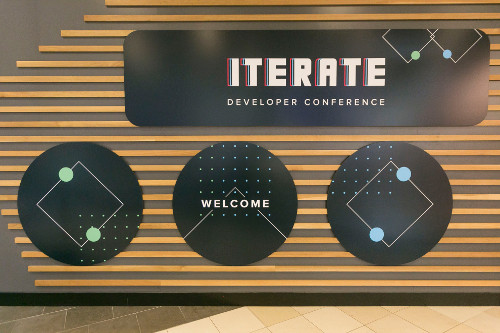
A couple weeks ago (Tuesday, Feb. 27) we officially ran the very first Iterate Developer Conference. Not only did we have a ton of fun throwing a developer conference, but it was also a huge success and succeeded in hitting all of our goals.
In this post I’ll recap the Iterate experience from start to finish, including some interesting things I learned along the way.
If you weren’t lucky enough to attend Iterate, don’t worry – we’ll most definitely be running another one next year.
Want to know what Iterate was like? Check out our cool new recap video!
Why Host a Developer Conference?
Hosting a conference is a lot of work. If you’re considering hosting a developer conference of your own, you should sit down and clearly think about the end goal: why are you considering hosting a developer conference in the first place? It’s going to be a lot of work, a lot of stress, and a lot of money. Return on investment is not guaranteed and tracking ROI can be murky at best.
What it essentially boils down to is this: have a strong purpose and goal in mind before you dive into running a big event like a conference that will consume a massive amount of time and resources.
So, why did we decide to host a developer conference? Good question! ;) Okta, after all, already runs a large and successful conference called Oktane each year. Why add another one?
Oktane is primarily focused on Okta’s IT business and customers. While Oktane is a great event (Barack Obama AND Kumail Nanjiani will be speaking there this year!) we wanted to host a separate conference that would truly embody the developer spirit and serve as a tribute to hackers everywhere.
We wanted to host a conference that would:
- Exist to serve developers and no one else.
- Not be about marketing, sales, or self promotion. We wanted our new conference to be 100% genuine and authentic to the developer community in a way that is simply not possible when the goal of your event is to make money.
- Motivate developers to improve themselves: get better at their craft, become more effective in their jobs and businesses, find new ways to keep their passions alive, and realize their full potential.
We decided upfront that we’d track our success through post-event surveys with carefully selected questions and gauge our success against a rubric.
Once we had the goal in mind, we thought about what sort of event we wanted to craft that would allow us to succeed in our mission.
Building a Mindful Developer Conference
I’ve attended a ton of developer conferences in my life, both as an attendee and speaker. And while I absolutely love technology conferences – I’ve always felt like they’re typically missing something.
Most developer conferences focus on a particular piece of technology (Pycon for Python, GopherCon for Go), but to my knowledge there are no developer conferences that focus on all the skills you need to be an awesome developer.
Being a great developer is about a whole lot more than just staying up-to-date with the latest frameworks and tools. It’s about staying passionate over many years, continuously automating and improving all aspects of your work (even when you’re busy), helping out your co-workers and collaborators, and many other soft skills that are absolutely necessary to those of us seeking the topmost tiers of performance.
Picking a Theme
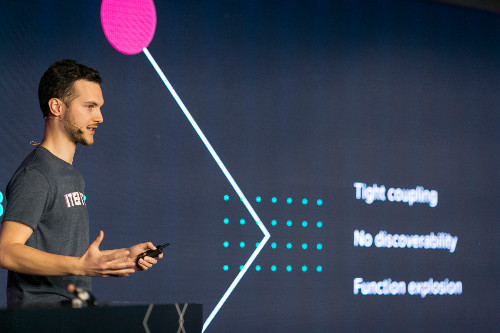
To ensure Iterate was an event we could all be proud of, the four of us sat down to discuss our ideas and decided to build Iterate around the theme of constant improvement: Iteration.
From there we decided to have two talk tracks at Iterate: Build and Evolve.
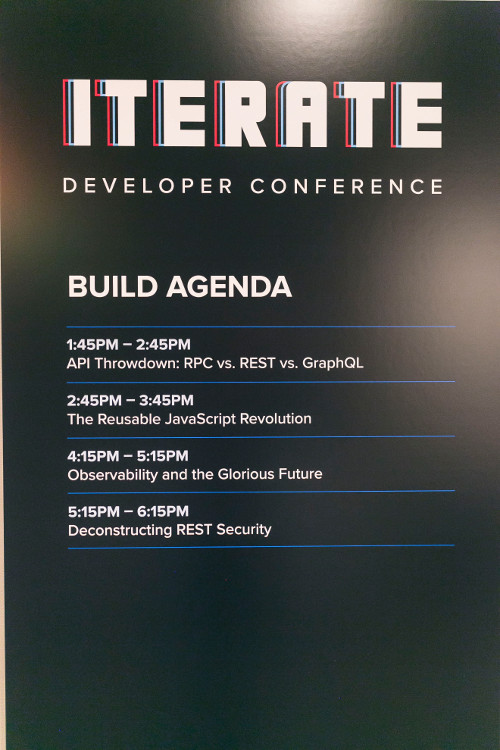
Build was our technical track consisting of four carefully selected topics that educated the audience about what’s happening at the bleeding edge of technology. What are the latest and most important things to know for frontend developers and backend developers? What should developers know about security to stay relevant and build secure applications? What are other important aspects of development that are rapidly changing?
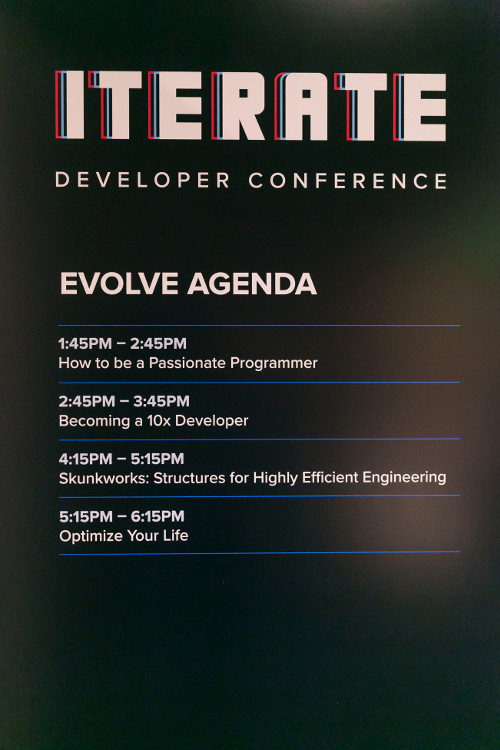
Evolve was our culture track that consisted of four talks about improving yourself as a developer in non-technical ways: measuring and automating your life so you can tweak what doesn’t work and double down on what does, how to stay passionate over the long haul, how to build a team and culture at your company that enables everyone to be a 10x developer, and also how to be massively productive by discarding management norms and working in innovative ways.
Making Your Conference Feel Special
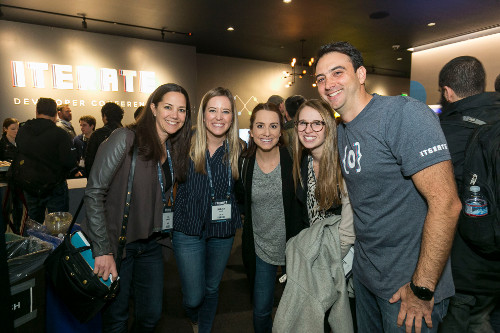
Once we had our tracks defined and topics planned out in a way that made sense, we started working on all the details that would make Iterate truly unique. We pulled in ideas from the best conferences we’ve attended in the past, and threw in some new ideas of our own.
I, for instance, was really adamant about starting the conference around lunch time (something that Heroku did with their Waza conference, hands down the best developer event of all time). I abhor waking up early to make it to events that start at 8 or 9am.
We wanted our attendees to show up to Iterate awake and refreshed, not sluggish from just waking up and commuting to the venue. Starting with lunch would give attendees a chance to make friends and hang out before diving into technical talks and intense focus.
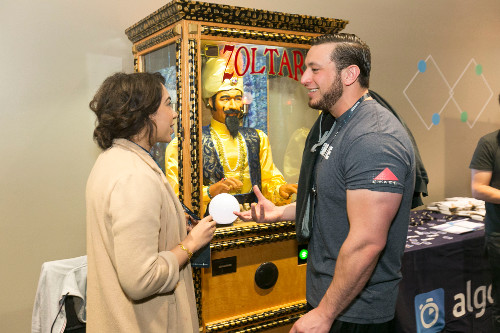
To stay true to our mission of being authentic and focusing on building a hacker friendly event, we also decided to not do any self promotion: we didn’t have typical vendor booths and we didn’t focus on lead collection activities.
Instead: we partnered with some of the best developer companies on the planet: Twilio, Algolia, Atlassian, and the JS Foundation who each crafted their own “experiences” for attendees to enjoy.
Each of our partner companies really understand developers and what we were trying to do which helped make the event really special. >:) We only work with the best!
In short: we tried our best to make Iterate something truly unique and appealing to our audience.
The Iterate Experience
When the big day finally came, everything really came together nicely.
After lunch, we started the conference off in the main room. Every attendee found a copy of Jeff Atwood’s book, Effective Programming: More Than Writing Code, on their seat. This is the book on writing quality software.
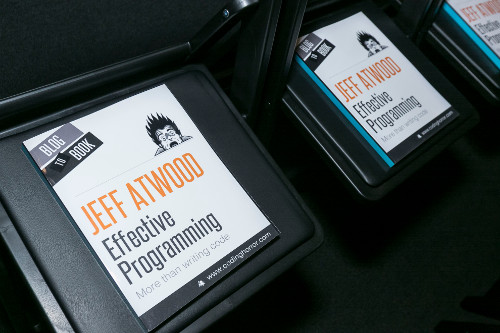
We opened the conference up with an AWESOME intro video (which we’ll upload soon) set to the best programming music ever made and a great talk by Alex Salazar introducing the conference and setting the tone.
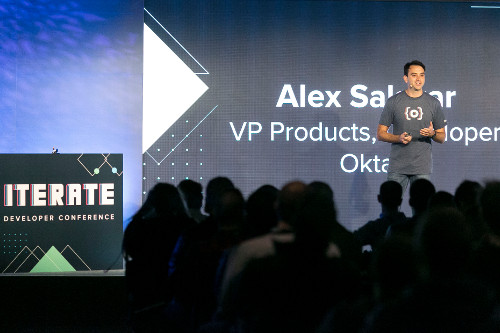
The intro video is a story in and of itself, but imagine a huge LED wall and a pitch black stage. Then imagine a terminal tinted green (like those old school CRT monitors). After a few seconds you see some typing and a programmer opens a file and starts writing cryptic Python code. A moment later the program is finished and the newly created program runs. Queue a stream of slowly printing ASCII art which prints a welcome message and has some hidden hacker emblems. =) Finally, the program introduces the first speaker of the day and slowly fades away. It was pretty epic.
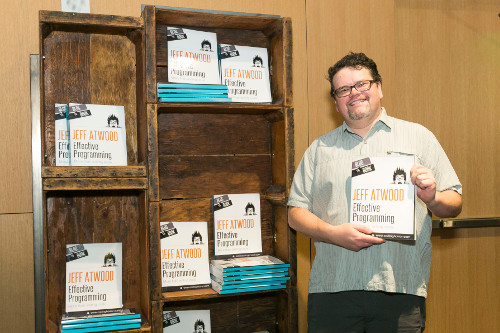
Jeff Atwood, co-founder of StackOverflow and Discourse, as well as one of the most influential developers of all time then gave an amazing keynote about crafting software. If you’re a software developer, you really owe it to yourself to watch his talk: it was absolutely fantastic for anyone who’s building programs that people interact with.
Once the keynote had finished, attendees split up into the two tracks (Build and Evolve) and the first round of talks got started.
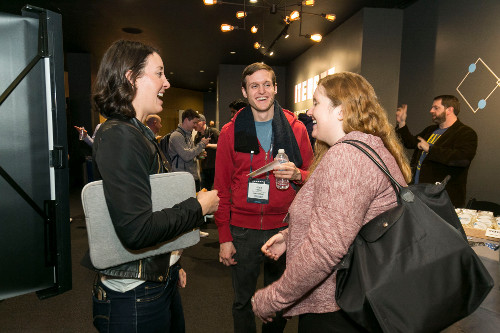
During breaks attendees went out into the main hall to grab snacks (we had awesome food!) and partake in the partner experiences:
- Twilio had baristas
- Algolia brought a massive Zoltar machine that spat out developer fortunes
- Atlassian built a programmer trivia game and gave away prizes
- The JS Foundation had popcorn and puns
- We (Okta) hosted a really fun photo booth
- We (Okta For Good) also hosted a donation station where developers could pledge to either:
- Donate money to the Open Source Collective, a fund that distributes money to open source projects in need of funding
- Donate their time towards contributing to an open source project: writing docs, fixing bugs, or adding features
Once the conference talks were over (each track consisted of four talks), we turned the main conference hall into a big party. Everyone hung out, made friends, and had a good time.
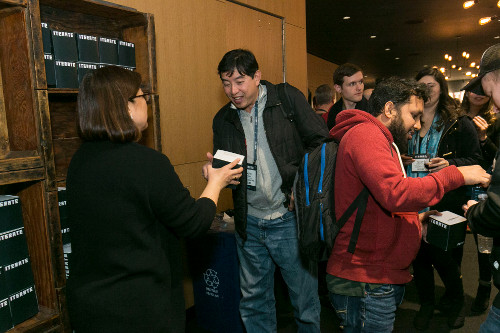
Throughout the day, attendees also got a pretty cool Iterate t-shirt and Google Home Mini to take home with them as a thank you for coming. People loved this.
PS: If you want to watch some of the Iterate talks, you should go check them out on our Developer YouTube Channel!
The Review
Once Iterate was all wrapped up the following week, the conference team got together to discuss the event, what worked well and what didn’t.
Based on what we heard from attendees, we succeeded in doing what we set out to do: throw an authentic developer conference that got attendees excited and motivated to continue fine-tuning their craft.
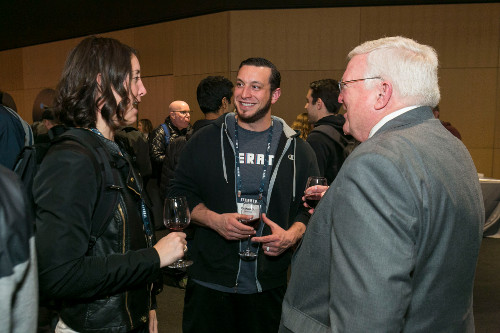
In my personal Iterate experience, I could see that all the attendees had a really good time. Everyone I spoke with said they loved the conference, the talks, the “vibe”, and had a great time. I heard at least 20 different developers say they were really motivated and hyped to go write some software – that made me happy. One awesome attendee even wrote up a recap of the event!
While there were a few minor things we all thought we could do better next time, the overall sentiment was very positive. Looking over the event and all the responses from attendees, we all felt pretty damn proud being part of the Iterate team. =)
Iterate was a ton of fun, and all of us helping put it together had a blast. I want to give a massive shout-out to some of the core crewmembers who really made it all happen (in no particular order):
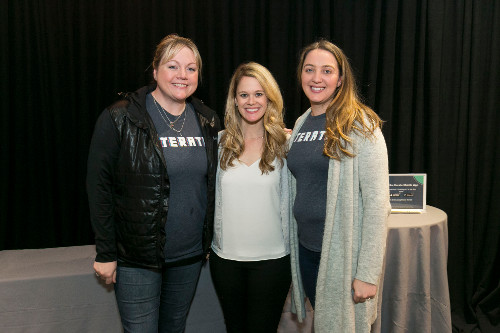
Y’all are awesome >:D
If you’re thinking about throwing a conference of your own, feel free to drop a comment below or shoot me an email.
Okta Developer Blog Comment Policy
We welcome relevant and respectful comments. Off-topic comments may be removed.